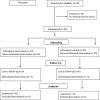A comparison between the effects of simulation of basic CPR training and workshops on firefighters' knowledge and skills: experimental study
- PMID: 38395870
- PMCID: PMC10893681
- DOI: 10.1186/s12909-024-05165-z
A comparison between the effects of simulation of basic CPR training and workshops on firefighters' knowledge and skills: experimental study
Abstract
Background: One of the most common causes of death worldwide is cardiopulmonary arrest. Firefighters are among the first responders at the scenes of accidents and can, therefore, play a key part in performing basic cardiopulmonary resuscitation (CPR) for victims who need it. The present study was conducted to compare the effects of simulation training against workshops on the CPR knowledge and skills of firefighters in the south of Iran.
Methods: This experimental (Interventional) study was conducted on 60 firefighters of south of Fars province, Iran. The study was undertaken from March to July 2023. Through random allocation, the participants were divided into two groups: simulation-based training (30 members) and traditional workshop training (30 members). The participants' CPR knowledge and practical skills were measured before, immediately after, and three months after intervention.
Results: The findings of the study revealed a statistically significant difference between the pretest and posttest CPR knowledge and skill mean scores of the simulation groups as compared to the workshop group (p < 0.001). As measured three months after the intervention, the firefighters' knowledge and skill mean scores were still significantly different from their pretest mean scores (p < 0.001); however, they had declined, which can be attributed to the fact that the study population did not frequently exercise CPR.
Conclusion: Based on the findings of the study, even though both methods of education were effective on enhancing the firefighters' CPR knowledge and skill, simulation training had a far greater impact than training in workshops. In view of the decline in the participants' knowledge and skill scores over time, it is recommended that short simulation training courses on CPR should be repeated on a regular basis.
Keywords: Basic life support; Cardiopulmonary resuscitation; Education; Firefighters; Simulation.
© 2024. The Author(s).
Conflict of interest statement
The authors declare no competing interests.
Similar articles
-
The effect of scenario-based training versus video training on nurse anesthesia students' basic life support knowledge and skill of cardiopulmonary resuscitation: a quasi-experimental comparative study.BMC Med Educ. 2024 May 9;24(1):488. doi: 10.1186/s12909-024-05490-3. BMC Med Educ. 2024. PMID: 38724939 Free PMC article. Clinical Trial.
-
Retention of CPR skills learned in a traditional AHA Heartsaver course versus 30-min video self-training: a controlled randomized study.Resuscitation. 2007 Sep;74(3):476-86. doi: 10.1016/j.resuscitation.2007.01.030. Epub 2007 Apr 17. Resuscitation. 2007. PMID: 17442479 Clinical Trial.
-
Effectiveness of simulation-based cardiopulmonary resuscitation training programs on fourth-year nursing students.Australas Emerg Care. 2021 Mar;24(1):4-10. doi: 10.1016/j.auec.2020.08.005. Epub 2020 Sep 12. Australas Emerg Care. 2021. PMID: 32933888
-
Associations between cardiopulmonary resuscitation (CPR) knowledge, self-efficacy, training history and willingness to perform CPR and CPR psychomotor skills: A systematic review.Resuscitation. 2019 May;138:259-272. doi: 10.1016/j.resuscitation.2019.03.019. Epub 2019 Mar 27. Resuscitation. 2019. PMID: 30928504
-
Effectiveness of school-based CPR training among adolescents to enhance knowledge and skills in CPR: A systematic review.Curationis. 2022 Nov 18;45(1):e1-e9. doi: 10.4102/curationis.v45i1.2325. Curationis. 2022. PMID: 36453813 Free PMC article.
References
MeSH terms
LinkOut - more resources
Full Text Sources
Medical
Research Materials


